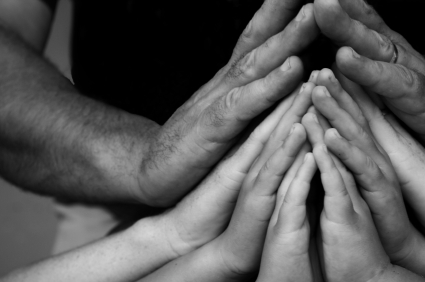This past Saturday was graduation for St. Vincent College. As is the tradition, there is a reception right outside of the building where graduation occurs so that faculty, students, and parents can mill about and say one last good-bye. In the midst of this informal social, I was in a conversation with one of my colleagues. He joked, “So, do theology majors ever get jobs?” Becoming a bit defensive, I replied, “Yes, always, the church has been hiring for over 2,000 years.”
Mulling this over, I am still unhappy with this response. While the question was intended to be jocular, it reflected the cultural assumption that those in theology never get jobs because they are in the humanities, not practical, not valuable like those in STEM, and thus are not only useless but jobless. This assumption—that you cannot do anything with a theology major—is even more pressing given the high unemployment rates, the need for ever greater salaries just to get by, and the amount of student debt that often accrues to those attending college [See Julie Rubio’s post on the high cost of colleges]
When I look over my records of our graduating majors for the past five years (basically since I became chair of the department), I have found an amazingly high employment rate, a diverse set of career paths, and, I think, some insight into what people do with a theology major.
Over these five years, Saint Vincent College has graduated 41 majors, about 8 a year. Of these, only four have neither found a job nor attended graduate school. Even though two of these four just graduated and so are still in the job hunt, we have an 88% placement rate for our students. Of the students who have been placed,
- 3 have gone onto seminary
- 4 have gone on to teach religion in high schools
- 9 have gone into ministry in the church, typically youth ministry
- 6 have pursued MA’s in theology
- 3 did a year of volunteer work, two with the JVC’s and the other with Amate House in the Archdiocese Chicago
All of these fields pertain directly to the field of theology. The rest of the 12 have done some surprisingly different things.
- 2 are going to medical school
- 1 is attending law school
- 3 are in graduate school for psychology
- 1 is starting his own business
- 2 work in residence life
- 1 is a sales representative
- 1 is an EMT
- 1 is a Fireman
To me, these numbers indicate a few things. Yes, theology can be a degree that leads to graduate studies. No doubt about it.
The degree is also a professional one, preparing people for teaching or some form of ministry. I would have to say that most of our students come in wanting to be youth ministers or high school religion teachers, coming from and understanding the importance of great youth ministry programs or Catholic high schools.
Finally, the degree can be used to complement another major. Students pick up theology degrees because they want to understand their life or their primary field of study in light of their faith. To be sure, some become so taken with theology that it becomes their focus. Still, this is not all of them. They take their informed faith and become doctors and lawyers, counselors, and administrators. They enter service fields and seek to become faithful people. Is there a better expression of Vatican II’s call that
. . . by their competence in secular training and by their activity, elevated from within by the grace of Christ, let [the laity] vigorously contribute their effort, so that created goods may be perfected by human labor, technical skill and civic culture for the benefit of all men according to the design of the Creator and the light of His Word. May the goods of this world be more equitably distributed among all men, and may they in their own way be conducive to universal progress in human and Christian freedom. In this manner, through the members of the Church, will Christ progressively illumine the whole of human society with His saving light. (LG 36)
I think it is important to note these successes of my students, whichever direction they are heading, as they not only represent the emerging Catholic Church in the United States but they are the ones who are challenging the narrowing of education to exclusively technical training and job placement, neglecting questions about the value of one’s work or of one’s own life. These more substantive questions often get address in theology, and, as the numbers indicate, theology does not necessarily lead to a life of poverty and unemployment.
I said “not necessarily lead to a life of poverty and unemployment”. One can major in theology and earn money, but, often, those that want to pursue jobs or school in theology do so without regard for the money. They see themselves as working for the church, the church working for the poor, and the poor having little money. Increases in salary would come at the cost of those they serve, so they often forgo these financial incentives. There is a real danger to this way of looking at it (See Stanley Hauerwas point in, “Work as Co-Creation: A Critique of a Remarkably Bad Idea”) but one cannot help but be attracted to a life similar to the Sisters of the Presentation of the Blessed Virgin Mary who advertized, “We offer you no salary, no recompense, no holidays, no pensions. But much hard work, a poor dwelling, few consolations, many disappointments, frequent sickness, a violent or lonely death, an unknown grave.”
Even those majors that have high earning potential, seem to be thinking of more than skills and advancement. One of my former students is currently in law school. He came by for a visit after completing his second semester. He started by saying, “if anyone ever asks, I can vouch that all of the horror stories about law school are pretty much true.” When I asked how he did, he indicated that he ended up near the top of his class, a 4.0 to be exact, and was “excited beyond belief.”
In the midst of our conversation, he said he was thinking about writing an article on why Christians cannot be lawyers, basically how the profession has a history of marginalizing the poor. While I am not sure this will earn him a lot of money, I did think that this is one of the best examples of what one can do with a theology degree: ruin the legal (or really any) profession by challenging it to be more attentive to the needs of the poor.





This is a really helpful post, Jason. You won’t mind if I use some of this in our departmental propaganda, will you? One reason why few students think that studying theology will have little relevance to their working lives is that we do not, for the most part, teach about work and theology or spirituality. Yes, a social ethics course will touch upon labor issues as one of many course topics, but work doesn’t get a course of its own in our theology departments. Contrast this situation with an issue like sexuality: undergrads are probably more likely to think that theology has something to say about sex. And why shouldn’t they? They’ve been explicitly taught what theology has to say about sex. I’d like to see a lot more gen ed theology courses dealing with work as a moral and spiritual issue. I taught a course on work this year, and it opened a lot of students’ eyes. (Come to my CTS panel to hear more about this!)
Jason,
I’ve been saying this for years about our majors. They are doing all kinds of interesting things and seem at least as employable as the much more numerous business, psychology, and communications majors. I direct our MA program in theology and I’ve found that over the last ten years nearly all of our graduates have landed jobs in their fields, in high schools, parishes, Catholic Worker houses, non-profits, health care institutions, and universities. Though not all live in poverty some choose to, and many have a wealth of options open to them precisely because they aren’t tied to a big salary.
We also have a similarly high, or even higher, job placement rate, although I don’t think we have as many people going into non-religious studies related fields. That would actually be interesting to see which fields’ graduates are having the worst time with unemployment and underemployment.
Also, just to brag for a minute, but the Presentation Sisters you mention in your post are based here in Dubuque!
Great post. Just to add one small thing: when I was an undergraduate theology major at Notre Dame, we habitually answered the question “What are you going to do with a theology major?” with the quip “Anything that requires me to read, write, or think.” It usually threw business majors for a loop. And it’s really true, as your graduates’ career paths indicate.
Good post. A colleague once told me that studies have been done that show that humanities majors do make less than their peers right out of college but they actually make more than their peers 10 years out. The reasoning is that humanities majors know people, not just facts; they know how to think, not just calculate. Thus, humanities majors rise to leadership positions more quickly and more often than their peers with science degrees. (Unfortunately, neither my colleague or I have been able to find the original study again, so this remains an anecdote, rather than a supported reply to the naysayers.) Also, because of the low salaries of most ministry and teaching positions, this probably doesn’t fit quite as well for theology majors as it does for the broader category of humanities, but I think the logic still holds, especially for those theology majors that don’t end up in ministry and teaching. (I just keep thinking how great the bedside manner of those 2 former theology majors / med students must be.)
Great post. I am a student at Fordham University. I will declare as a history and theology major soon and I am already tired of answering that question. I do not feel closed off from any profession. Yes, I will pursue a higher degree but my theology degree will enhance my professional and personal life. My theological training will color my perspective forever- that is the point, for me. I am not certain that I will want to teach but I do know that I want to maintain a particular ethical standard.
I would like to add a plug for my vocation. For more than three decades, lay Catholics called to pastoral work can pursue careers in chaplaincy, with a graduate theology degree. And it’s a growing field. See http://www.nacc.org/